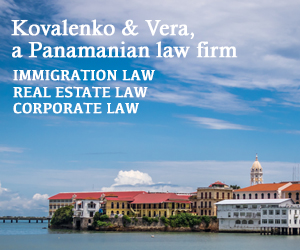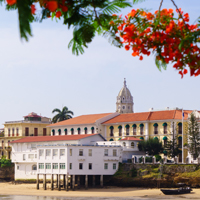Educational System in Panama
Summary: The one tip that you hear expats living in Panama repeatedly sharing with newcomers is not to buy a home when you first move to Panama. Rent for a few months or longer so that you have time to find the right neighborhood. Give yourself time to ensure that Panama is right for you for the long term. If you've already taken time to do those things and are ready to take the plunge and become a property owner, here are tips about buying a home in Panama.
Relocating to a new country can be a daunting experience, especially when it comes to understanding the educational system for your children. Panama, a country known for its rich culture and biodiversity, also boasts a diverse and inclusive educational system. This guide aims to provide expats with a comprehensive understanding of the Panamanian educational system, including the main stages of education, enrollment procedures, language requirements, public and private schooling options, and alternative education methods such as homeschooling and online schooling.
What are the main stages of education in Panama?
The Panamanian educational system is divided into three main stages: pre-primary education (educación preescolar), primary education (educación primaria), and secondary education (educación secundaria). Pre-primary education is optional and caters to children aged 4 to 5. Primary education is compulsory and covers ages 6 to 11, while secondary education, also compulsory, caters to students aged 12 to 17. Each stage focuses on different aspects of a child's development and learning.
Pre-primary Education
Pre-primary education in Panama, also known as educación preescolar, is optional and caters to children aged 4 to 5. This stage focuses on the holistic development of the child, including cognitive, physical, social, and emotional aspects. It provides a foundation for children to develop basic skills and prepare for primary education.
Primary Education
Primary education, or educación primaria, is compulsory in Panama and covers ages 6 to 11. This stage focuses on the development of basic literacy, numeracy, and science skills. It also introduces students to subjects such as social studies, arts, and physical education. The curriculum is designed to provide a well-rounded education and foster a love for learning.
Secondary Education
Secondary education, or educación secundaria, is also compulsory and caters to students aged 12 to 17. This stage is divided into two cycles: pre-media (lower secondary) and media (upper secondary). The curriculum includes core subjects such as mathematics, science, social studies, and Spanish, as well as elective subjects. Students are also encouraged to participate in extracurricular activities to develop their interests and talents.
How does a newcomer from a different country enroll their kids in school?
To enroll your child in a Panamanian school, you will need to provide a birth certificate, proof of residence, and previous school records. If these documents are in a language other than Spanish, they must be translated and notarized. It's also recommended to contact the school directly for specific enrollment procedures as they may vary.
Can my children enroll in a public school if they are still learning Spanish?
Yes, children who are still learning Spanish can enroll in public schools in Panama. However, it's important to note that the medium of instruction in public schools is Spanish. Some schools may offer additional language support for non-Spanish speaking students, but this varies from school to school.
Are there public bilingual schools in Panama?
Yes, there are public bilingual schools in Panama, particularly in urban areas. These schools offer instruction in both Spanish and English. Admission for international students typically involves an application process and may require proof of language proficiency.
What types of private schools are common in Panama?
Private schools in Panama come in various forms, including Catholic schools, international schools, and bilingual schools. International schools often follow a curriculum from another country (such as the U.S. or U.K.) and offer instruction in English. Bilingual schools provide instruction in both Spanish and English. Private schools often have more resources and smaller class sizes compared to public schools.
Do expats typically send their children to public or private school?
Many expats in Panama choose to send their children to private schools due to the language barrier in public schools and the high standard of education offered by private institutions. However, the choice between public and private schooling depends on individual family needs and circumstances.
How expensive are Private schools in Panama?
The cost of private schools in Panama varies widely depending on the school and the level of education. On average, annual tuition can range from $1,000 to over $10,000. It's recommended to contact the school directly for accurate tuition information.
Are you allowed to homeschool while living in Panama?
Yes, homeschooling is allowed in Panama. However, it's not as common as in some other countries and resources may be limited. If you choose to homeschool, it's important to ensure that your child is still meeting the educational standards set by the Panamanian Ministry of Education.
May kids attend online school instead of a local school while living in Panama?
Yes, online schooling is an option in Panama. This can be a good solution for families who are temporarily residing in the country or for those who prefer a more flexible learning schedule. However, it's important to ensure that the online school is accredited and meets the educational standards set by the Panamanian Ministry of Education.
About the Author
 Betsy Burlingame is the Founder and President of Expat Exchange and is one of the Founders of Digital Nomad Exchange. She launched Expat Exchange in 1997 as her Master's thesis project at NYU. Prior to Expat Exchange, Betsy worked at AT&T in International
and Mass Market Marketing. She graduated from Ohio Wesleyan University
with a BA in International Business and German.
Betsy Burlingame is the Founder and President of Expat Exchange and is one of the Founders of Digital Nomad Exchange. She launched Expat Exchange in 1997 as her Master's thesis project at NYU. Prior to Expat Exchange, Betsy worked at AT&T in International
and Mass Market Marketing. She graduated from Ohio Wesleyan University
with a BA in International Business and German.
Some of Betsy's articles include 12 Best Places to Live in Portugal, 7 Best Places to Live in Panama and 12 Things to Know Before Moving to the Dominican Republic. Betsy loves to travel and spend time with her family. Connect with Betsy on LinkedIn.
Additional Information:
- Panama Guide
- Healthcare & Health Insurance in Panama
- Members Talk about Healthcare & Health Insurance in Panama
- Best Places to Live in Panama
- Real Estate in Panama
- Guide to Real Estate in Panama
- Pros & Cons of Living in Panama
- Cost of Living in Panama
- Top Hospitals in Panama by Specialty
- Best Places to See While on a Look-See Trip to Panama (Plus, Itineraries)
- Moving with a Pet to Panama
- Mental Health Care in Panama
- 2025 Guide to Living in Panama
- Pros and Cons of Living in Panama 2025
- 2025 Guide to Moving to Panama
- More Advice about Retiring in Panama
- Members Talk about the Cost of Living in Panama




